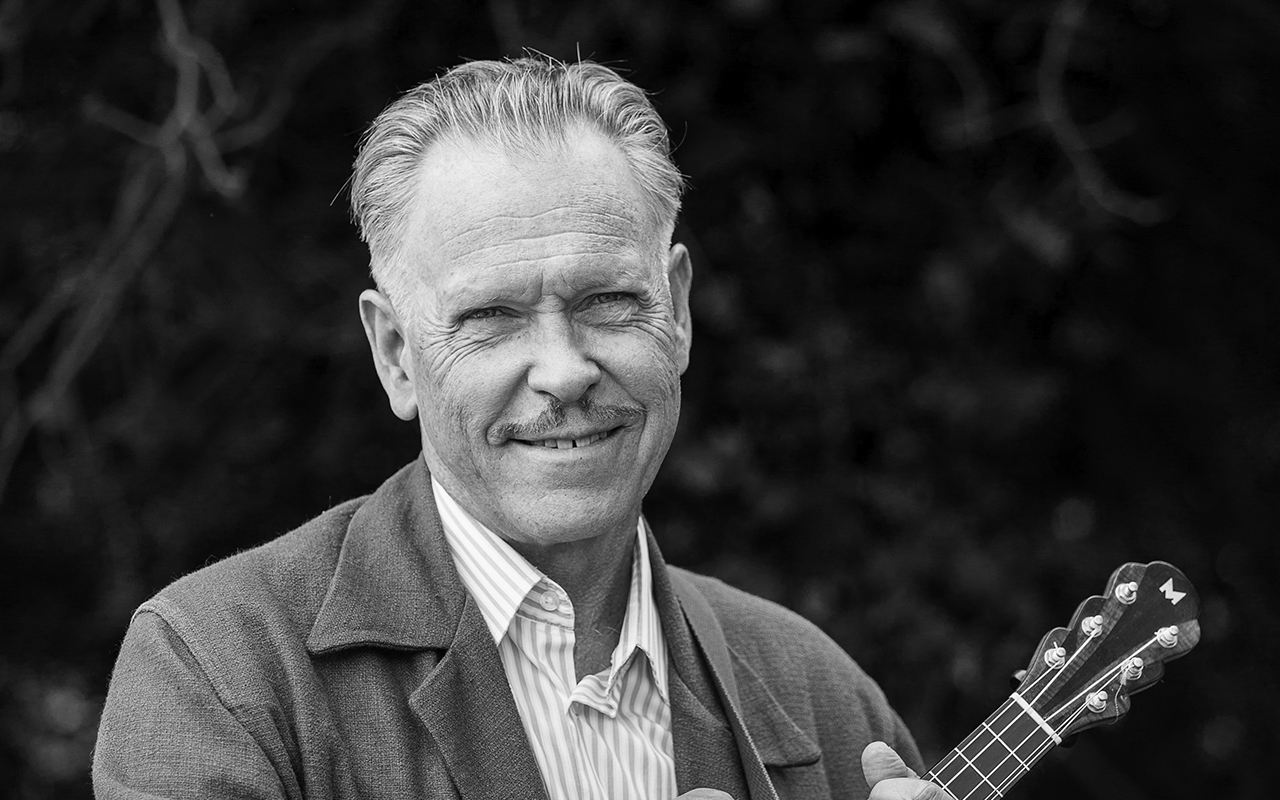
Casey MacGill photo by Daniel Sheehan
Transported into the speakers, Casey MacGill watched as Robert Johnson played the guitar and recorded music, invisible to the blues musician.
It was Los Angeles, it was the Sixties, it was two teenagers listening to blues music in an opium-induced state. “That was a very cathartic experience for me,” MacGill recalls of his hallucination. “When I came down from that experience, I didn’t want to hear anything but blues, and so I didn’t listen to anything but blues music for two years.”
And so began swing musician Casey MacGill’s progression of musical influences – an education that has led him through a varied and successful career. He’s worn many hats: a busker on the streets of L.A., a performer on Broadway, a big band leader, a ukulele instructor. With blues at the cornerstone of his musical style, he continues to perform old 1920s, 30s, and 40s standards, as well as original compositions, as a solo artist and in his trio with bassist Matt Weiner and drummer Jo Jo Mascorella. He’s a familiar sight at venues like Vito’s and The Pink Door, he plays at weddings around the area, and is again slated to lead his big band orchestra at the Seattle Lindy Exchange in September. A bona fide swing musician, MacGill’s at an exciting time in his career, after a long journey to get here.
Sitting outside West Seattle’s C & P Coffee Company on a sunny Thursday afternoon, MacGill enjoys a “shot in the dark” paired with a frosted pink doughnut as he reflects on his musical upbringing. Growing up in a suburb of L.A., he relied on two friends from California, Hugh Frederick and Robert Armstrong, as his musical mentors who helped expand his tastes (it was Frederick, in fact, who shared the bowl of opium with him and introduced him to blues).
While MacGill says his family didn’t have much influence in his musical development, it was his grandmother who gifted him a ukulele as a Christmas present during one family vacation to Hawaii. “I really didn’t play the ukulele right at the time I got it, so it just sat around the house,” says MacGill.
Then, watching the 1960s variety show Hootenanny, which featured acts such as Hoyt Axton, Judy Collins, and The Carter Family, ignited an interest in folk music. “I started learning folk songs on the ukulele, and after about a year or so got a guitar and played that for a while,” he says.
After seeing Jimi Hendrix at the Monterey Pop Festival in 1967, however, and developing a deep interest in blues, MacGill started to teach himself to play the blues and boogie woogie on the piano.
With no formal training, he decided to major in music, first at Pasadena City College, then California State University, Los Angeles. After eight years as a part-time student, however, he never graduated. “I’ve always been playing catch up ever since I decided I wanted to get into music,” he says. “It’s kind of set me up as a perennial student, which is good. I’m always studying, always getting music books and biographies.”
MacGill also mentions he had a certain amount of luck with his teachers, who have included Gary Foster, Warne Marsh, and Buddy Collette. “Haven’t you had teachers in your life you just couldn’t imagine your education without?” he muses.
MacGill took his music to the streets of L.A., busking on his ukulele for the lines of moviegoers outside the theaters. “I couldn’t play piano out on the street,” he notes. “The uke was easy, and so what little I had learned on guitar about blues I transposed to the uke. It worked out pretty well. I kept it going on the side for a long time.”
From blues to folk to even a stint performing fusion jazz in the early 70s (“a disaster,” according to MacGill), it was finally 1980 when he started playing swing music full-time.
“Swing was a really unconscious decision,” he explains. “I didn’t really know where the center of my style was for the longest time.”
Playing with his friend Armstrong, who has an older, classic style, MacGill noticed himself wanting to play in a more rhythmic, swinging way. “It just kind of appeared, all of this ability to articulate what I wanted to do.”
His newfound style took MacGill from his hometown of L.A. to Spokane, where he spent about 17 years and played with The Spirits of Rhythm, to New York City, where he performed in the Tony-nominated 1999 Broadway musical Swing!, and finally to Seattle in 2002.
MacGill has a busy fall season coming up. He’s releasing an album of 1930s Tin Pan Alley pop tunes with a Hawaiian twist, which he recorded with Orville Johnson, at the beginning of August – his first new record since 2011. Later this year, the Casey MacGill Trio plan to make a live recording at The Pink Door, followed up with a studio recording.
“We’re just on the threshold on finding a whole bunch of new things about the music,” he says. “We’re on a new plateau.”
August also finds him traveling to Bethesda, Maryland, to take part in the Ukulele Festival a Strathmore, before leading the Casey MacGill Orchestra, featuring Gordon Au on trumpet, on September 14 for the Seattle Lindy Exchange.